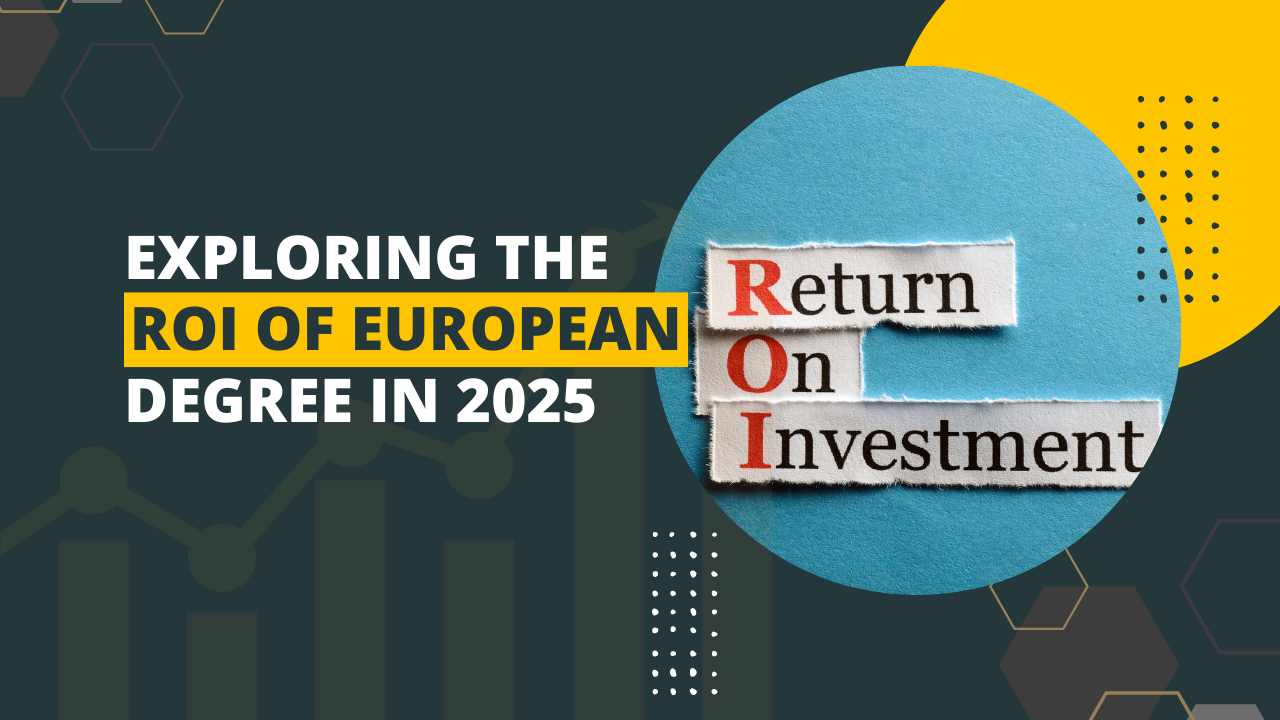Exploring the ROI of a European Degree in 2025
Choosing to pursue a higher education degree abroad is a significant investment. Europe has consistently been one of the top destinations for international students due to its world-class universities, diverse cultures, and affordable education options. In 2025, the return on investment (ROI) for a European degree remains a crucial consideration for prospective students. Let’s examine the value of earning a European degree and its implications for global employability and salary prospects.

Key Metrics to Measure ROI
ROI of a degree is determined by several factors:
- Cost of Education: Tuition fees and living expenses.
- Earning Potential: Average graduate salaries in various sectors.
- Employment Rates: Post-graduation employment within six months.
- Payback Period: Time required to recover educational expenses through earnings.
- Long-Term Career Benefits: Alumni success stories and career growth.
Comparative Analysis: Cost vs. Earning Potential
1. Cost of Education
| Country | Average Tuition (per year) | Living Expenses (per year) | Total (per year) |
|---|---|---|---|
| Germany | $0 – $1,500 | $10,000 | $10,000 – $11,500 |
| France | $3,000 – $6,000 | $12,000 | $15,000 – $18,000 |
| UK | $15,000 – $20,000 | $15,000 | $30,000 – $35,000 |
| Netherlands | $12,000 – $20,000 | $12,000 | $24,000 – $32,000 |
| Sweden | $10,000 – $20,000 | $13,000 | $23,000 – $33,000 |
| Italy | $2,000 – $4,000 | $10,000 | $12,000 – $14,000 |
| Ireland | $12,000 – $18,000 | $13,000 | $25,000 – $31,000 |
| Spain | $2,000 – $4,000 | $11,000 | $13,000 – $15,000 |
2. Earning Potential by Country
| Country | Average Graduate Salary (per year) |
| Germany | $60,000 |
| France | $50,000 |
| UK | $70,000 |
| Netherlands | $55,000 |
| Sweden | $65,000 |
| Italy | $45,000 |
| Ireland | $60,000 |
| Spain | $40,000 |
Graph: Average Cost vs. Average Graduate Salary
(Graph illustrating tuition fees and post-graduation salaries in selected European countries.)
Post-Graduation Employment Trends (2025)
Employment Rates
The job placement rate of graduates within six months of completing a degree:
| Country | Placement Rate (6 months) |
| Germany | 90% |
| France | 85% |
| UK | 88% |
| Netherlands | 87% |
| Sweden | 92% |
| Italy | 84% |
| Ireland | 89% |
| Spain | 82% |
In-Demand Sectors
- Germany: Engineering, IT, Renewable Energy
- France: Luxury Goods, Fashion, Artificial Intelligence
- UK: Finance, Law, Creative Industries
- Netherlands: Logistics, Green Technologies
- Sweden: Sustainability, Biotechnology
- Italy: Architecture, Design, Tourism
- Ireland: Pharmaceuticals, Technology, Finance
- Spain: Tourism, Renewable Energy, Agribusiness
Payback Period
The average time to recover educational expenses based on average annual salaries:
| Country | Average Payback Period |
| Germany | 2–3 years |
| France | 3–4 years |
| UK | 4–5 years |
| Netherlands | 3–4 years |
| Sweden | 2–3 years |
| Italy | 3–4 years |
| Ireland | 3–4 years |
| Spain | 4–5 years |
Long-Term Career Advantages
- Global Recognition: European degrees are highly regarded worldwide.
- Networking Opportunities: Access to robust alumni networks and international collaborations.
- Cultural Competence: Exposure to diverse environments enhances soft skills valued by global employers.
Conclusion
In 2025, earning a degree from a European institution offers a competitive ROI in terms of cost-effectiveness, employability, and global recognition. Countries like Germany and Sweden lead the way with low-cost education and shorter payback periods. Emerging destinations like Italy, Ireland, and Spain provide excellent opportunities for students seeking unique academic and cultural experiences.
Prospective students should carefully weigh their preferred field of study, desired country, and financial plan to maximize their return on investment.
Need personalized guidance to select the best university in Europe? Contact Edwest Global today!







